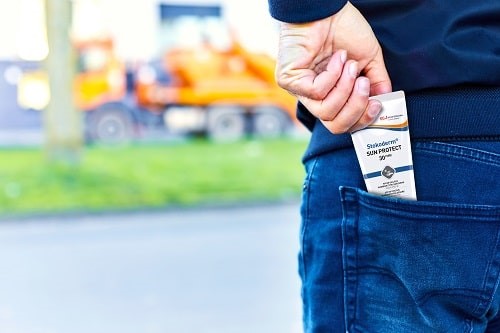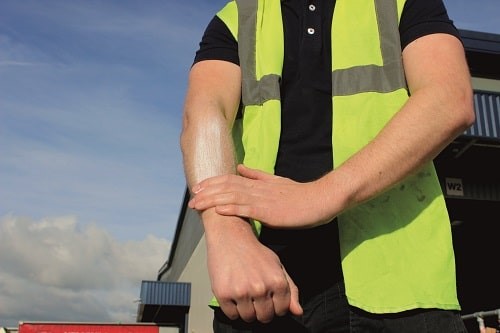With recent research showing that almost one in three outdoor workers in the UK never wear sunscreen to protect themselves from the sun’s harmful UV rays, it’s never been more important for employers to educate staff about the health risks – and provide appropriate sun protection products.
Features
Working in the sun: why it’s time to take action
Skin cancer is one of the occupational diseases with the highest number of suspected cases. Those most affected are employees who work partly or completely outdoors. Despite this, a YouGov survey commissioned in April 2023 by at-work skin care, cleaning and hygiene solutions provider SC Johnson Professional found that 30 per cent of outdoor workers in the UK never apply UV (ultraviolet) protection cream while at work. A third (34 per cent) of these respondents claimed that nothing would encourage them to do so, illustrating the scale of the challenge faced by employers.
The Health and Safety at Work Act 1974 (HSWA) states that there is a legal duty on every employer to ensure, as far as reasonably practicable, the health of their employees. The Management of Health and Work Regulations 1999 also require the employer to conduct a suitable assessment of the risks to the health of their workforce, including those risks from UV radiation from natural sunlight.
 Providing good quality sun protection cream is one simple way to fulfil duty of care. Photograph: SC Johnson Professional
Providing good quality sun protection cream is one simple way to fulfil duty of care. Photograph: SC Johnson Professional
Providing good quality sun protection cream when and where it is needed, such as at workplace entrances and exits and in outdoor areas, is one simple way that employers can help fulfil their duty of care and raise awareness of the risks of over-exposure to the sun among their workers. According to the research referenced later in this article, it is also one of the most effective ways to encourage UV protection usage in itself.
The findings of the YouGov survey in April 2023 build on SC Johnson Professional’s previous research into attitudes towards UV protection at work – among both those who work outdoors as well as decision-makers and health and safety managers in relevant sectors. In this most recent research, SC Johnson Professional commissioned YouGov to survey a representative sample of workers in the UK, with a total of 558 people who regularly worked outdoors responding, to delve into the ‘why’ behind the attitudes – looking into the reasons for the lack of use of UV protection at work.
Why don’t outdoor workers use UV protection?
One in three cancers diagnosed is a skin cancer and each episode of sunburn increases the risk of getting skin cancer. So why do those who work outdoors in the UK avoid using sun protection cream and other sun protection measures at work?
In this latest survey, a third of those outdoor workers who never use UV protection at work said that they didn’t think it was necessary. In SC Johnson Professional’s 2020 survey of 114 UK health and safety practitioners operating in industry, 30 per cent of these decision-makers also said that they believed the reason for the lack of UV protection usage was a general belief among workers that this type of protection at work in the UK is unnecessary. Further to this, 28 per cent of the workers questioned in the April 2023 survey stated that they don’t burn easily in the sun, citing this as their reason for never using UV protection.
 Once the UV index reaches three or above, sun protection measures should be taken. Photograph: SC Johnson Professional
Once the UV index reaches three or above, sun protection measures should be taken. Photograph: SC Johnson Professional
It is advised that, once the UV index reaches three or above, sun protection measures should be taken. During the summer months in the UK, the UV index regularly exceeds this level, and according to the Met Office, UV rays can be strong enough to cause sunburn in the UK between April and September. As well as this, 80 per cent of UVA rays pass through clouds. What is clear, is that UV protection is recommended and required during this six-month period in the UK – and more awareness is needed to encourage those who work outdoors to use it.
Outdoor employees should be encouraged to protect their skin all year round. By applying broad-spectrum sun protection cream with a high sun protection factor to all exposed skin and reapplying every two hours at a minimum, workers can actively help prevent themselves suffering sunburn, skin damage and long-term risks such as skin cancer.
A look at employer provision and responsibility
Sixteen per cent of those who never use sun protection at work said this was because it wasn’t provided by their employer. Having sun protection provided by their workplace was cited by almost a quarter (24 per cent) as something that would encourage them to use UV protection – and more than a fifth (22 per cent) also stated that having sun protection cream accessible when needed would encourage its usage.
Sun protection cream is essential when working outdoors, but protective clothing should also be considered. Outdoor workers should cover as much skin as possible by wearing long-sleeved shirts, trousers and wide-brimmed hats, as this will increase their protection against harmful UV rays.
Product priorities
The survey also asked outdoor workers who do use sun protection creams, what the most important factor was when it came to sun protection cream itself. Over half (54 per cent) said that they prioritised high UV protection, 47 per cent said that they prefer a non-greasy product, and a third said that they placed importance on it being water-resistant.
Having a product available that is fit for purpose, developed specifically for professional use and that meets user needs is crucial, especially when UV protection is at stake. For instance, employers should consider providing sunscreen that is perfume-free, water-resistant and offers broad spectrum UV protection against UVA, UVB and UVC rays. Some suncreams have also been specifically developed to help limit the effect on dexterity with hand-held tools, therefore ensuring a non-greasy after-feel once they have been applied to the skin.
Training and awareness
As we have seen, more than a third stated in the survey that nothing would encourage them to use sun protection cream. However, nearly two-thirds (61 per cent) of those who work outdoors agreed that understanding the effects of UV damage encourages them to use sun protection cream at work. Further to this, when comparing responses from those who work outside more than 25 per cent of the time with those who spend more than half their working time outdoors, our survey found little difference between attitudes towards UV protection.
As well as ensuring the health of employees, the HSWA states that employers must provide ‘information, instruction, training and supervision’ to ensure their workforce’s safety. As a decision-maker or health and safety manager, the challenge is to encourage those who never use UV protection to consider it, and to help outdoor workers understand the effects of UV damage – even if employees spend the majority of their time working outside, they may still be unaware of the risks it can bring.
SC Johnson Professional has a suite of free resources that can be used to train employees who work outdoors, and for health and safety professionals to implement as part of a skin care training programme. The resource pack includes a guide for outdoor workers, posters to raise awareness and a toolbox talk presentation. The presentation can help managers to deliver quality, informative training, and includes videos that illustrate real-life case studies and simple facts to bring home the reality of over-exposure.
Considering the demographics of outdoor workers
When taking a deeper dive into how gender affected respondents’ answers, it was found that women are significantly more likely than men to apply sun protection cream at work at least once per day (28 per cent versus 18 per cent), and that men are more likely to think that sun protection cream is unnecessary at work (36 per cent) than women (21 per cent). It is more difficult to encourage men to use sun protection cream at work than women; 38 per cent of men said nothing would encourage them to do so, versus 25 per cent of women.
When looking at age, SC Johnson Professional wanted to see if it had an impact on the workers’ attitudes towards sun protection measures. The survey revealed the older the respondent, the more likely they are to feel that high UVA and UVB protection is important in a sun protection cream.
Find out more about SC Johnson Professional’s resources and product range at: scjp.com/en-gb/whats-new/campaigns/uv-sun-protection
All figures, unless otherwise stated, are from YouGov Plc. Total sample size was 4,435 adults, of whom 558 were outdoor workers. Fieldwork was undertaken on 14–18 April 2023. The survey was carried out online. The figures have been weighted and are representative of all UK adults aged 18-plus.
FEATURES

Sedentary working and how to combat the ‘sitting disease’
By Gavin Bradley, Active Working on 05 April 2024
Prolonged and excessive sitting poses a major risk to our health, but the Get Britain Standing campaign and On Your Feet Britain Day on 25 April are a great way of encouraging workers to sit less and move more.

Company culture and wellbeing: a crucial link
By Bex Moorhouse, Invigorate Spaces on 05 April 2024
Investing in measures to support worker wellbeing will be ineffective unless the company culture genuinely incorporates values like teamwork, involvement, flexibility and innovation.

Office design and culture: happier and healthier staff – or the opposite?
By Guy Osmond, Osmond Ergonomics on 03 April 2024
Applying ergonomic principles to workstation set-ups and ensuring the physical environment supports neurodivergent people are just some of the ways of creating an office where everyone can thrive, but a supportive and positive organisational culture is vital too.


